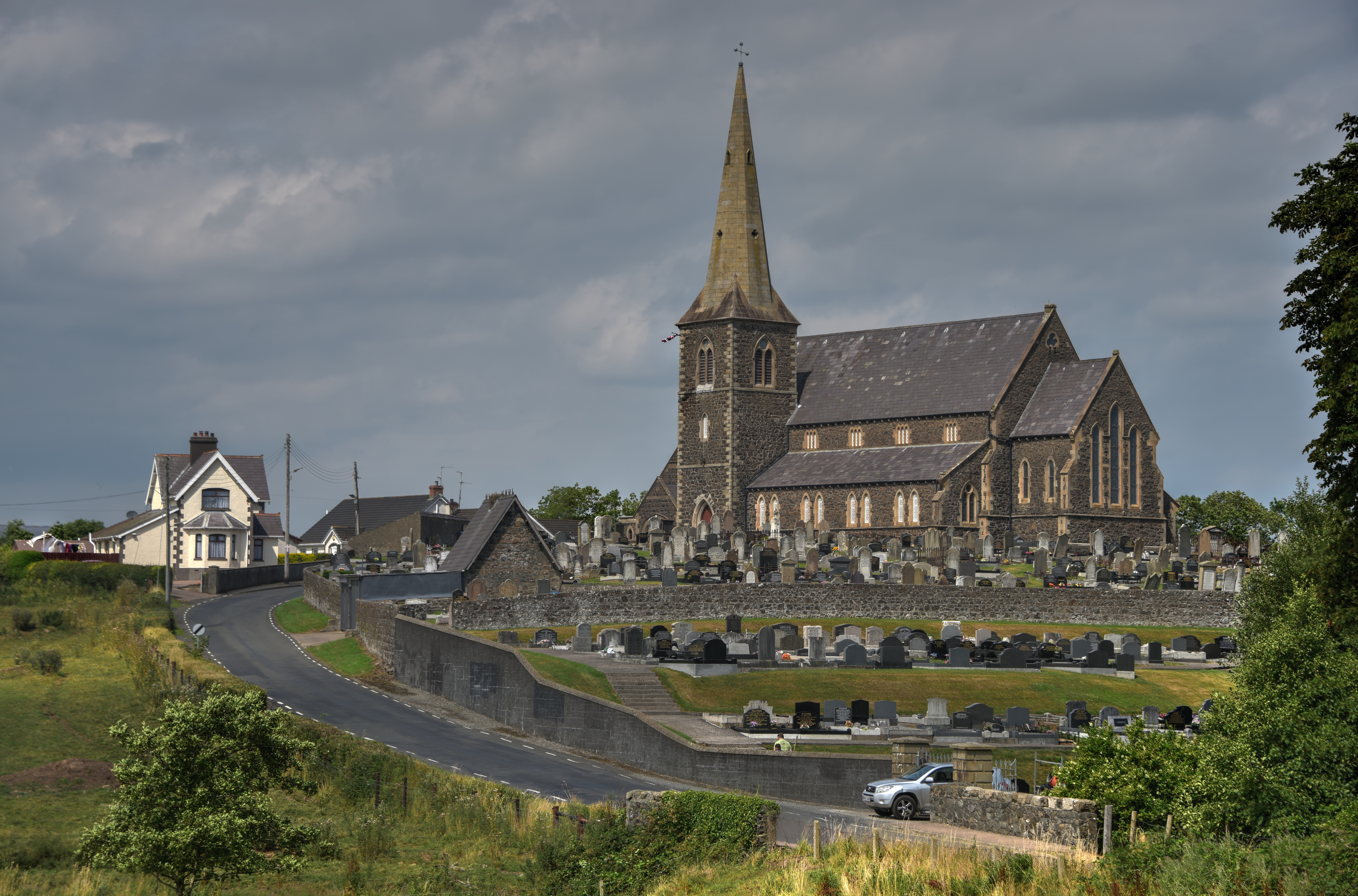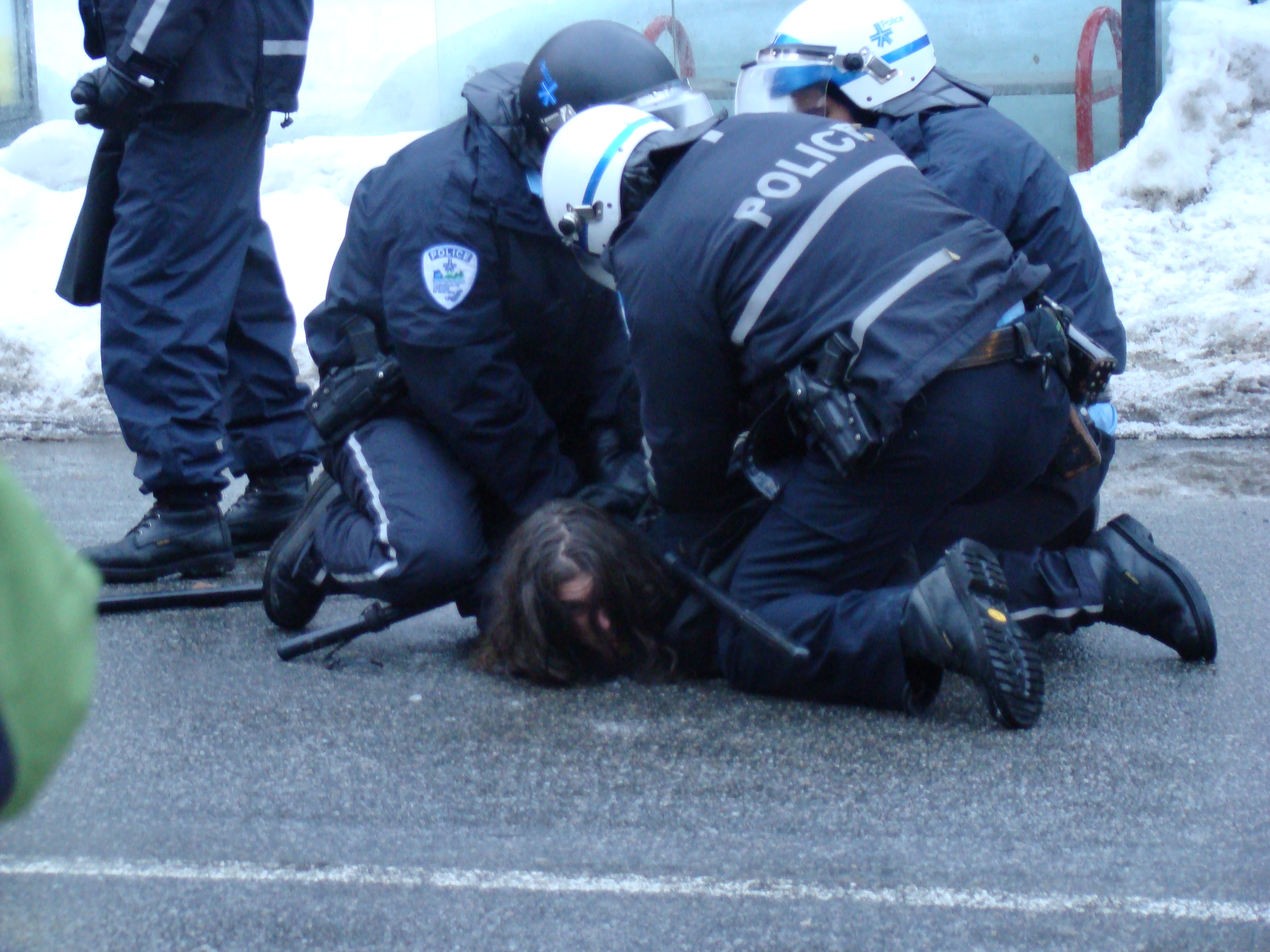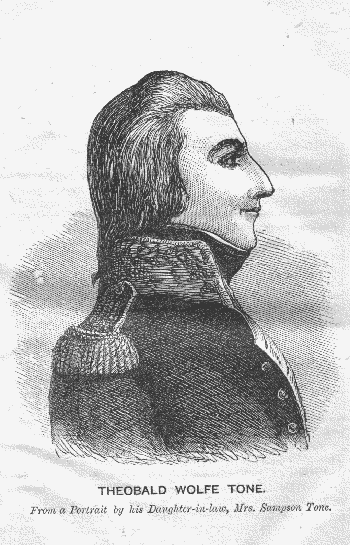|
1997 Northern Ireland Riots
From 6 to 11 July 1997 there were mass protests, fierce riots and gun battles in Irish nationalist districts of Northern Ireland. Irish nationalists/ republicans, in some cases supported by the Provisional Irish Republican Army (IRA), attacked the Royal Ulster Constabulary (RUC) and British Army. The protests and violence were sparked by the decision to allow the Orange Order (a Protestant, unionist organization) to march their traditional route, passing through a Catholic/nationalist neighbourhood of Portadown. Irish nationalists were outraged by the decision and by the RUC's aggressive treatment of those protesting against the march. There had been a bitter dispute over the march for many years. It was the last spell of widespread violence in Northern Ireland before the signing of the Good Friday Agreement in April 1998. RUC and British Army patrols were attacked hundreds of times by rioters throwing stones and petrol bombs, and by IRA members with automatic rifles and gren ... [...More Info...] [...Related Items...] OR: [Wikipedia] [Google] [Baidu] |
The Troubles
The Troubles () were an ethno-nationalist conflict in Northern Ireland that lasted for about 30 years from the late 1960s to 1998. Also known internationally as the Northern Ireland conflict, it began in the late 1960s and is usually deemed to have ended with the Good Friday Agreement of 1998. Although the Troubles mostly took place in Northern Ireland, at times violence spilled over into parts of the Republic of Ireland, England, and mainland Europe. Sometimes described as an Asymmetric warfare, asymmetric or Irregular warfare, irregular war or a low-intensity conflict, the Troubles were a political and nationalistic struggle fueled by historical events, with a strong Ethnic conflict, ethnic and sectarian dimension, fought over the Partition of Ireland, status of Northern Ireland. Unionism in Ireland, Unionists and Ulster loyalism, loyalists, who for Plantation of Ulster, historical reasons were mostly Ulster Protestants, wanted Northern Ireland to remain within the United Ki ... [...More Info...] [...Related Items...] OR: [Wikipedia] [Google] [Baidu] |
An Phoblacht
''An Phoblacht'' (Irish pronunciation: ; ) is a Sinn Féin-affiliated online Irish republicanism, Irish republican news platform which also publishes a quarterly print magazine format. Editorially the paper takes a Left-wing politics, left-wing position and was supportive of the Northern Ireland peace process. Along with covering Irish political and trade union issues the newspaper frequently featured interviews with celebrities, musicians, artists, intellectuals and international activists. History Earlier publications The original ''An Phoblacht'' was founded as the official organ of the Dungannon Clubs in Belfast in 1906 and its first edition was printed on 13 December 1906 under the English-language version of the title ''The Republic''. In the first edition, Bulmer Hobson, one of the founders of the Dungannon Clubs, set out their aims: A year later the paper merged with a Dublin publication called ''The Peasant''. However, the title ''An Phoblacht'' was again used fro ... [...More Info...] [...Related Items...] OR: [Wikipedia] [Google] [Baidu] |
Provisional Irish Republican Army Campaign 1969–1997
From 1969 until 1997,Moloney, p. 472 the Provisional Irish Republican Army (IRA) conducted an armed paramilitary campaign primarily in Northern Ireland and England, aimed at ending British rule in Northern Ireland in order to create a united Ireland. The Provisional IRA emerged from a split in the Irish Republican Army in 1969, partly as a result of that organisation's perceived failure to defend Catholic neighbourhoods from attack in the 1969 Northern Ireland riots. The Provisionals gained credibility from their efforts to physically defend such areas in 1970 and 1971. From 1971 to 1972, the IRA took to the offensive and conducted a relatively high-intensity campaign against the British and Northern Ireland security forces and the infrastructure of the state. The British Army characterised this period as the "insurgency phase" of the IRA's campaign. The IRA declared a brief ceasefire in 1972 and a more protracted one in 1975, when there was an internal debate over the feasibil ... [...More Info...] [...Related Items...] OR: [Wikipedia] [Google] [Baidu] |
Belfast
Belfast (, , , ; from ) is the capital city and principal port of Northern Ireland, standing on the banks of the River Lagan and connected to the open sea through Belfast Lough and the North Channel (Great Britain and Ireland), North Channel. It is the second-largest city in Ireland (after Dublin), with an estimated population of in , and a Belfast metropolitan area, metropolitan area population of 671,559. First chartered as an English settlement in 1613, the town's early growth was driven by an influx of Scottish people, Scottish Presbyterian Church in Ireland, Presbyterians. Their descendants' disaffection with Kingdom of Ireland, Ireland's Protestant Ascendancy, Anglican establishment contributed to the Irish Rebellion of 1798, rebellion of 1798, and to the Acts of Union 1800, union with Kingdom of Great Britain, Great Britain in 1800—later regarded as a key to the town's industrial transformation. When granted City status in the United Kingdom#Northern Ireland, city s ... [...More Info...] [...Related Items...] OR: [Wikipedia] [Google] [Baidu] |
Police Brutality
Police brutality is the excessive and unwarranted use of force by law enforcement against an individual or Public order policing, a group. It is an extreme form of police misconduct and is a civil rights violation. Police brutality includes, but is not limited to, asphyxiation, beatings, shootings, improper takedowns, Racism, racially-motivated violence and unwarranted use of Electroshock weapon, tasers. History The first modern police force is widely regarded to be the Metropolitan Police Service in London, established in 1829. However, some scholars argue that early forms of policing began in the Americas as early as the 1500s on plantation colonies in the Caribbean. These slave patrols quickly spread across other regions and contributed to the development of the earliest examples of modern police forces. Early records suggest that labor strikes were the first large-scale incidents of police brutality in the United States, including events like the Great Railroad Strike ... [...More Info...] [...Related Items...] OR: [Wikipedia] [Google] [Baidu] |
Plastic Bullet
Plastic bullet can refer to: * Plastic baton round: a large, blunt, low-velocity projectile fired from a specialized gun, intended as a less-lethal weapon for riot control and an alternative to rubber bullets. * Plastic bullet: a conventionally sized and shaped bullet made from a composite material including plastic, fired from a conventional rifle and capable of penetrating human tissue, intended as a less lethal weapon for riot control. * Plastic bullet (target shooting): a blunt, lightweight handgun bullet intended for short-range target practice, not intended for use as a weapon. Both types of plastic bullet intended for riot control have caused deaths. Plastic bullets are generally used for riot control. Some plastic bullets are intended to be aimed at the ground so as to ricochet into the target; others are intended to be fired directly at a person. Plastic baton rounds were invented by British researchers to provide a more accurate alternative to rubber bullets, and ... [...More Info...] [...Related Items...] OR: [Wikipedia] [Google] [Baidu] |
Petrol Bomb
A Molotov cocktail (among several other names – ''see '') is a hand-thrown incendiary weapon consisting of a frangible container filled with flammable substances and equipped with a fuse (typically a glass bottle filled with flammable liquids sealed with a cloth wick). In use, the fuse attached to the container is lit and the weapon is thrown, shattering on impact. This ignites the flammable substances contained in the bottle and spreads flames as the fuel burns. Due to their relative ease of production, Molotov cocktails are typically improvised weapons. Their improvised usage spans criminals, gangsters, rioters, football hooligans, urban guerrillas, terrorists, irregular soldiers, freedom fighters, and even regular soldiers; usage in the latter case is often due to a shortage of equivalent military-issued munitions. Despite the weapon's improvised nature and uncertain quality, many modern militaries exercise the use of Molotov cocktails. However, Molotov cocktails are ... [...More Info...] [...Related Items...] OR: [Wikipedia] [Google] [Baidu] |
Good Friday Agreement
The Good Friday Agreement (GFA) or Belfast Agreement ( or ; or ) is a pair of agreements signed on 10 April (Good Friday) 1998 that ended most of the violence of the Troubles, an ethno-nationalist conflict in Northern Ireland since the late 1960s. It was a major development in the Northern Ireland peace process of the 1990s. It is made up of the Multi-Party Agreement between most of Northern Ireland's political parties, and the BritishIrish Agreement between the British and Irish governments. Northern Ireland's present devolved system of government is based on the agreement. Issues relating to sovereignty, governance, discrimination, military and paramilitary groups, justice and policing were central to the agreement. It restored self-government to Northern Ireland on the basis of " power sharing" and it included acceptance of the principle of consent, commitment to civil and political rights, cultural parity of esteem, police reform, paramilitary disarmament and e ... [...More Info...] [...Related Items...] OR: [Wikipedia] [Google] [Baidu] |
Portadown
Portadown ( ) is a town in County Armagh, Northern Ireland. The town is based on the River Bann in the north of the county, about southwest of Belfast. It is in the Armagh City, Banbridge and Craigavon Borough Council area and had a population of about 32,000 at the United Kingdom Census 2021, 2021 Census. For some purposes, Portadown is treated as part of the "Craigavon Urban Area", alongside Craigavon (planned town), Craigavon and Lurgan. Although Portadown was founded during the early 17th century English Plantation of Ulster, it was not until the Victorian era and the arrival of the railway that it developed as a major town. It earned the nickname "hub of the North" because it was a major railway junction; here the Great Northern Railway (Ireland), Great Northern Railway's line diverged for Belfast, Dublin, Armagh and Derry. In the 19th and 20th centuries, Portadown was also a major centre for the production of textiles (mainly Irish linen, linen). Portadown is the site of ... [...More Info...] [...Related Items...] OR: [Wikipedia] [Google] [Baidu] |
Unionism In Ireland
Unionism in Ireland is a political tradition that professes loyalty to the Monarchy of the United Kingdom, crown of the United Kingdom and to the union it represents with England, Scotland and Wales. The overwhelming sentiment of Ireland's Protestantism in Ireland, Protestant minority, unionism mobilised in the decades following Catholic Emancipation in 1829 to oppose restoration of a separate Parliament of Ireland, Irish parliament. Since Partition of Ireland, Partition in 1921, as Ulster unionism its goal has been to retain Northern Ireland as a devolved region within the United Kingdom and to resist the prospect of an United Ireland, all-Ireland republic. Within the framework of the Good Friday Agreement, 1998 Belfast Agreement, which concluded three decades of political violence, unionists have shared office with Irish nationalists in a reformed Northern Ireland Assembly. As of February 2024, they no longer do so as the larger faction: they serve in an executive with an Iri ... [...More Info...] [...Related Items...] OR: [Wikipedia] [Google] [Baidu] |
British Army
The British Army is the principal Army, land warfare force of the United Kingdom. the British Army comprises 73,847 regular full-time personnel, 4,127 Brigade of Gurkhas, Gurkhas, 25,742 Army Reserve (United Kingdom), volunteer reserve personnel and 4,697 "other personnel", for a total of 108,413. The British Army traces back to 1707 and the Acts of Union 1707, formation of the united Kingdom of Great Britain which joined the Kingdoms of Kingdom of England, England and Kingdom of Scotland, Scotland into a Political union, single state and, with that, united the English Army and the Scots Army as the British Army. The Parliament of England, English Bill of Rights 1689 and Convention of the Estates, Scottish Claim of Right Act 1689 require parliamentary consent for the Crown to maintain a peacetime standing army. Members of the British Army swear allegiance to the Charles III, monarch as their commander-in-chief. The army is administered by the Ministry of Defence (United Kingd ... [...More Info...] [...Related Items...] OR: [Wikipedia] [Google] [Baidu] |
Irish Republicanism
Irish republicanism () is the political movement for an Irish Republic, Irish republic, void of any British rule in Ireland, British rule. Throughout its centuries of existence, it has encompassed various tactics and identities, simultaneously elective and militant and has been both widely supported and iconoclastic. The Modern era, modern emergence of nationalism, democracy, and Classical radicalism, radicalism provided a basis for the movement, with groups forming across the island in hopes of independence. Parliamentary defeats provoked uprisings and armed campaigns, quashed by British forces. The Easter Rising, an attempted coup that took place in the midst of the First World War, provided popular support for the movement. An Irish republic was declared in 1916 and officialized following the Irish War of Independence. The Irish Civil War, beginning in 1922 and spurred by the Partition of Ireland, partition of the island, then occurred. Republican action, including armed cam ... [...More Info...] [...Related Items...] OR: [Wikipedia] [Google] [Baidu] |








